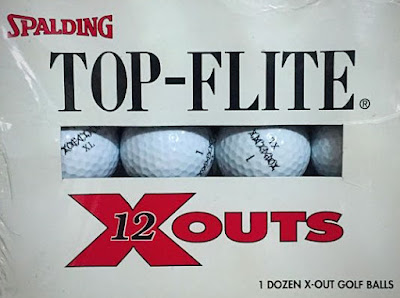X-Out Golf Balls: What You Need to Know
Think of X-out golf balls as a company's way of saying, "Our quality control procedures flagged these balls as having minor issues. We don't think those issues will have any significant impact on play for most golfers, but, still, because they have flaws of some kind we aren't willing to sell them at regular price or market them in the normal way."
In this article we'll cover whether X-out golf balls play the same as regular balls; whether they are "legal" to play according to the Rules of Golf; how they compare to golf balls stamped "Practice"; and more.
But let's start here: Why are they called X-outs? The name comes from the row of X's that, when X-outs first started being sold, were stamped over the brand name of the ball. Originally, all golf ball companies that offered X-outs would cover up the brand name on the ball with a row of capital X's stamped over the brand. The brand name was, literally, X'ed-out. Today, that type of X-out is still seen in the market. But many manufacturers today leave the brand name uncovered and instead stamp the word "X-out" (or an X inside a circle) on the side of the golf ball.
What's wrong with X-out golf balls? There is no way for the purchaser of a box of X-outs to know what the specific defects are for any given golf ball in the box. Some of the balls you just bought might have only cosmetic defects — printing errors, basically. A blemish, smudged ink, paint whose color is just a bit off.
But minor physical defects might also be present in X-outs. Perhaps a ball is slightly out of balance, perhaps the core is very slightly off-center or the cover is not perfectly smooth. Major physical defects should result in an affected golf ball never making it out of the factory.
Do X-outs play the same as regular golf balls? Usually, yes. But not always. And there is no way for the purchaser of X-outs to know which balls play the same as "regular" balls, and which don't (unless an X-out plays so poorly or feels so different that it is obvious — but that's not supposed to happen).
A Titleist representative once explained that X-out balls, "occasionally have a minor physical defect that should not significantly affect its performance. More often than not, the physical condition causing the ball to be stamped as an X-Out is so minute that it is not recognizable by the player."
Are X-outs the same as balls stamped "Practice"? No. X-outs might have minor performance flaws. Golf balls that a manufacter has stamped with the word "Practice" meet the company's quality control requirements for performance but have some kind of cosmetic flaw. For more, see What's the Difference Between X-Outs and 'Practice' Balls?
Are X-outs conforming? Can you use them in tournament play? According to the Rules of Golf, X-outs are fine for use in any competition setting that does not require balls that appear on the List of Conforming Golf Balls. If a tournament or committee, however, has implemented a Local Rule to require the List of Conforming Golf Balls, X-outs are "illegal" for play. For more, see Are X-Out Golf Balls Allowed Under the Rules?
Where can you buy X-outs? Back in the day when all X-outs were the type whose brand name was covered up by a row of X's, golfers could find them pretty much only by stumbling across them in a discount store's physical location. Today, though, many online retailers that sell golf balls will, sometimes, have X-outs in stock. Some manufacturers even, sometimes, offer X-outs directly to consumers. And it is still possible to run across boxes of X-outs in physical locations such as pro shops or discount stores.
Related articles:
- Can you use 'Practice' balls in tournaments?
- Is it OK to repair pitch marks using a tee?
- Are golf ball pickups for your putter OK under the rules?
(Book titles are affiliate links; commissions earned)
Lennox, Doug. Now You Know Golf, "Why are X-out balls illegal under the Conforming Ball condition?" Dundurn Press, 2008
R&A and USGA. Official Rules of Golf. https://www.randa.org/rules/rules-hub
TaylorMadeGolf.com. TP5/TP5 Practice Balls, https://www.taylormadegolf.com/TP5%2FTP5x-Practice-Balls/DW-WZ962.html
Titleist.com. Team Titleist, "Dumb question," https://www.titleist.com/teamtitleist/team-titleist/f/golf-balls/9495/dumb-question
Titleist.com. Team Titleist, "X-Out Balls," https://www.titleist.com/teamtitleist/team-titleist/f/golf-balls/19915/x-out-balls
